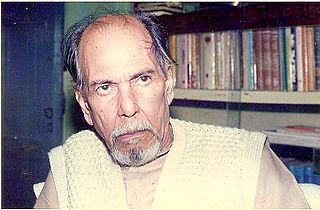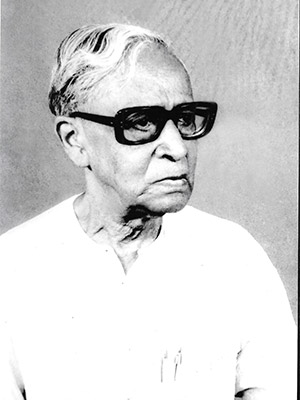Katyayanidas Bhattacharya | |
|---|---|
 | |
Katyayanidas Bhattacharya (1917 - 1966) was an Indian scholar and philosopher of Indian and Western philosophy.
Katyayanidas Bhattacharya | |
|---|---|
 | |
Katyayanidas Bhattacharya (1917 - 1966) was an Indian scholar and philosopher of Indian and Western philosophy.
Born on 17 October 1917 (1 September 1918 according to some), to Bhubaneswar Bhattacharya, an Ayurveda physician and Shailaja Devi, Katyayanidas passed his Matriculation Examination from his village school in Chunta and Intermediate Arts Examination (IA) from Bridaban College (now known as Brindaban Government College), Habiganj (both now in Bangladesh), in 1936 and 1939 respectively. In Intermediate Examination, he stood first in logic in the University of Calcutta and was awarded Saradaprasad Prize by the university. In between, he pursued traditional courses in Sanskrit for a year (1936–37) under Pandit Surendra Chandra Tarka-Sankhya-Vedantatirtha. [1] Though he started studying English literature (Honours) in the college at Habiganj, his performance in logic and Sanskrit in the Intermediate Examination led him to change course to Philosophy. Dr. Shyama Prasad Mukherjee, a political figure and educationalist at that time, took interest in the young man and insisted that Katyayanidas shift to Calcutta and take admission to Ashutosh College (named after his father Sir Ashutosh Mukherjee) in BA Course with Honours in Philosophy. Professor Kalidas Sen who was the Principal of Ashutosh College at that time provided support and encouragement to Katyayanidas. As a student of the college he started writing scholarly articles in college magazine viz. "Glimpses in the Psychology of Laughter", [2] "Is Free Will a Fact?". [3] He succeeded in securing first position in first class in the University of Calcutta in 1941 and was awarded Ramtanu Lahiri Gold Medal, Hemanta Kumar Gold Medal and Keshab Chandra Sen Gold Medal by the university. Thereafter he also stood first in first class in the MA (Philosophy) Examination of the University of Calcutta in the year 1943, [4] with record marks and was awarded University Gold Medal and some other medals and prizes.
As a student and subsequently as a teacher, Katyayanidas attracted notice of the academic philosopher Dr. Surendranath Dasgupta, who described his pupil in MA as one who "seemed to know very much more than an average first class M.A." [5]
His essays "The concept of subtle body in Sankhya Philosophy", [6] [7] "Paschatya Darshane Ishwarer Astitwa Bichar" (Discussion on existence of God in the Western Philosophical thoughts) [8] were important contributions in the subject in 1950s. [9] [10] His other contributions included "The Theory of Emergence in the Philosophy of Alexander", [11] "The Meeting of Extremes in Alexander's Philosophy of Mind", [12] "Nature and Function of Adjunct in Sankara Vedanta", [13] Paschatya manovijnane moner swarup (The identity of Mind in the Western Psychology). [14] The translated work of Katyayanidas from original Sanskrit included "Iswarakrishna's Samkhyakarika", an obscure Sanskrit Text, assigned to 3rd Century A.D., on Sankhya Philosophy, in English. [15] Some of his writings written for general readers viz."Bhabbader Tatparya O Prakarbhed" (Significance and classification of Idealism), [16] "Paschatya Darshane Amaratwer Bichar" (Discussion on the concept of continuity of life in Western Philosophical Thoughts), [17] "Jader Swarup Jingyasar Itihas" (The History of questioning the identity of non-living matters), [18] "Praner Swarup Jingyasar Itihas" (The History of questioning the identity of living matters), [19] were published in the Bengali daily Anandabazar Patrika and other magazines of Calcutta.
The Society for Indian Philosophy and Religion, Elkins, West Virginia, USA, in their Journal of Indian Philosophy and Religion brought out Collected Works of Katyayanidas Bhattacharya [20] which included his articles on "Religious Consciousness", [20] "Necessity of Religion", [20] "Caird's Philosophy of Religion: Objections to Scientific Treatment", [20] "Contemporary Trends in the Philosophy of Life" [20] and "God in the Philosophy of Alexander". [20]
Katyayanidas started teaching at Asutosh College, Calcutta. On joining the West Bengal Education Service in 1948, he was first posted to Krishnagar Government College and then to Victoria College of Cooch Behar (now known as Acharya Brojendra Nath Seal College) and Central Calcutta College (now known as Maulana Azad College) before joining Presidency College, Calcutta (now known as Presidency University) in July 1959. Concurrently, he was lecturing in an honorary capacity, at the University of Calcutta.[ citation needed ]
Katyayanidas was a connoisseur of Indian classical music and used to play tabla well. At one point of time he also edited the Bengali cultural journal Jayanti which was brought out first from Chunta (Brahmanbaria) and subsequently from Calcutta. His elder brother, Bireswar Bhattacharya, was the author of the novel Muktir Dak (Call for Freedom), written against the background of freedom struggle of India in 1940s. Katyayanidas was married to Uma Bhattacharya, daughter of Priyanath Bhattacharya and Sudhabala Devi of Bidyakut in the year 1948. The couple had four sons Amitabha, Niranjan, Sugata and Gautam, who all established themselves in their respective field of work subsequently. Katyayanidas died at the age of 49 on 26 October 1966.[ citation needed ]

Krishnachandra Bhattacharyya, commonly referred to as K.C. Bhattacharyya,, was a modern Indian philosopher affiliated with the University of Calcutta. He gained renown for his method of "constructive interpretation," a scholarly approach employed to elucidate and elaborate upon the interrelationships and intricacies inherent in ancient Indian philosophical systems. This method facilitated an examination of these systems akin to the scrutiny applied to contemporary philosophical problems. Bhattacharyya dedicated particular attention to the inquiry into the manner in which the mind engenders what appears to be a material universe. Notably, Bhattacharyya advocated for an immersive cosmopolitanism, wherein Indian philosophical frameworks were contemporized through a process of assimilation and immersion, eschewing a mere replication of European ideas in favour of a more nuanced integration.

The University of Calcutta is a public state university located in Kolkata, West Bengal, India. It has 151 affiliated undergraduate colleges and 16 institutes in Kolkata and nearby areas. It was established on 24 January 1857 and is the oldest multidisciplinary university of Indian Subcontinent and South East Asian Region. Today, the university's jurisdiction is limited to a few districts of West Bengal, but at the time of its establishment it had a catchment area ranging from Kabul to Myanmar. Within India, it is recognized as a "Five-Star University" and accredited an "A" grade by the National Assessment and Accreditation Council (NAAC).

Sir Ashutosh Mukherjee was a prolific Bengali educator, jurist, barrister and mathematician. He was the first student to be awarded a dual degree from Calcutta University. Perhaps the most emphatic figure of Indian education, he was a man of great personality, high self-respect, courage and towering administrative ability. The second Indian Vice-Chancellor of the University of Calcutta for four consecutive two-year terms (1906–1914) and a fifth two-year term (1921–23), Mukherjee was responsible for the foundation of the Bengal Technical Institute in 1906, which was later known as Jadavpur University and the University College of Science of the Calcutta University in 1914.

Surendranath Dasgupta was an Indian scholar of Sanskrit and Indian philosophy.

University of North Bengal is a public state collegiate major research university in North Bengal region of West Bengal, which is located in Raja Rammohanpur, Siliguri, Darjeeling district, in the Indian state of West Bengal. A second campus is in Danguajhar, Jalpaiguri in Jalpaiguri district and a third campus is in Salt Lake, Kolkata also in West Bengal. The university was established in 1962 to fill growing manpower needs in the six North Bengal districts and the neighbouring state of Sikkim. North Bengal University offers degrees in undergraduate, post-graduate taught-research, doctorate and post doctoral programs.

Amiya Bhushan Majumdar was an Indian novelist, short-story writer, essayist and playwright. In a writing career spanning over four decades, Majumdar wrote numerous novels, short stories, plays and essays in Bengali. Known as the ‘Writer’s Writer’, Majumdar is considered one of the most noteworthy authors of modern Bengali prose. His works received significant critical acclaim and recognition – including the Sahitya Academi Award for his novel Rajnagar in 1986

Asutosh College, established in 1916, is an Undergraduate Honors degree college in Kolkata. It offers undergraduate(Hons.) level courses in various arts, commerce and science subjects and also postgraduate degrees in select science and arts subjects. This college is situated in Southern Kolkata, close to the Jatin Das Park Metro Station, gate No. 2. It is affiliated to the University of Calcutta and is widely regarded as one of the best college to study Economics, Mathematics and Statistics in Kolkata.
Haridas Bhattacharyya (1891–1956) was a Bengali Indian philosopher, author and educationist, known for his works on comparative religion.

Prabodh Chandra Goswami (1911–1984) was an Indian school teacher who worked in Jenkins School, Cooch Behar from 1951 to 1971. He was one of the most competent Mathematics teachers in the school during that period and also taught other subjects such as English, Bengali and Sanskrit.
Shashibhusan Dasgupta, or Shashi Bhushan Dasgupta, Shashibhusan and Shashi Bhusan Das Gupta (1911–1964) was a Bengali scholar of philosophy, languages, literature, literary critic, author and theologian.

City College is a composite state government-aided public college, affiliated to the University of Calcutta. It offers undergraduate level courses in various arts, commerce and science subjects. The college is very popular for undergraduate study in the neighborhood of Kolkata.

Cooch Behar Panchanan Barma University (CBPBU) is a public state university in Cooch Behar, West Bengal, India. The university was named after the 19th-century Rajbangshi leader and social reformist Panchanan Barma.
Ashutosh is a male given name and one of the names given to Shiva. The word Ashutosh refers to someone who can be easily gratified and someone who fulfils wishes instantly. Ashutosh is one of the thousand names of Mahadeva.

Durga Mohan Bhattacharyya was an Indian scholar of Sanskrit. He had served as a professor of Sanskrit at the Scottish Church College in Calcutta.
Punya Datta was an Indian cricketer. He played first-class cricket for Bengal and Cambridge University. In a first-class career spanning from 1944-45 to 1955-56, Dutta scored 1,459 runs with a highest of 143. He averaged 29.77 with the bat, scored 4 centuries and 5 fifties, and held 12 catches. He captured 41 wickets at 37.09, and his best innings figures were 5 for 52.
Hansanarayan Bhattacharya, a researcher of Sanskrit and Bengali literature, was born in Mirhat village, West Bengal, India.

Khudiram Das was an Indian scholar, educationist, critic, litterateur, an authority on Rabindra literature and linguistic expert.

Santragachi Kedarnath Institution is a Government-sponsored, Bengali medium, higher secondary school located in Howrah in the state of West Bengal, India. The first vernacular Bengali medium school of Howrah district, Santragachi Minor School, that was originally founded by Kedarnath Bhattacharya in 1857, was converted to Santragachi Kedarnath Institution in 1925. Prof. Ashutosh Mukherjee, the second Indian Vice-Chancellor of the University of Calcutta laid the foundation stone in 1920.
Bidhushekhar Shastri (1878–1957) was a Bengali Sanskrit scholar, editor and linguist.